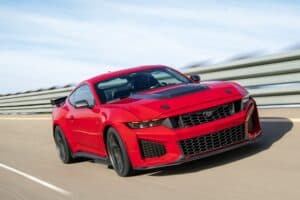Rail siding at its Pretoria plant is not yet fully operational and Transnet cannot say when it will be.

Ford South Africa anticipates it will have 79 trucks a day transporting its next generation Ranger vehicles from its Silverton plant in Gauteng to the Durban port by 2025.
That’s if the challenges with Transnet’s rail network are not fixed.
Neale Hill, president of Ford Motor Company Africa region, said on Tuesday a rail link to the plant is a very important and integral part of the development of the Tshwane Automotive Special Economic Zone (TASEZ).
The TASEZ was developed in tandem with Ford’s R15.8 billion investment in its local operations and supplier tooling in preparation for the production of the new Ranger.
However, Hill said the rail link is not fully operational and Ford is currently transporting almost all of the Ranger units it is producing for the export market by road.
He said the company has not received any timeline from Transnet on when the rail siding to its plant will be fully operational.
Hill confirmed the plan had been to transport the vast majority of vehicles destined for the export market by rail, but the number of trains it is getting from Transnet “is below our expectations and requirements”.
“This is something we continue to engage very closely with Transnet about because the most efficient way anywhere in the world, outside of South Africa, is to use rail infrastructure to transport vehicles as opposed to trucks.
“Regretfully, we are having to resort to using trucks at the moment because the service delivery from Transnet is not where it needs to be,” he said at a function to celebrate the first next generation Ford Ranger coming off the Silverton plant’s production line.
ALSO READ: Ex-Transnet boss says he’s not corrupt, denies R300k kickbacks
Hill said Transnet had informed Ford SA that it does not have the facilities and infrastructure in terms of rolling stock to provide the service required by the plant.
Moneyweb has approached Transnet for comment, but it was yet to be received at the time of publication.
Presidential priority
Hill said Ford SA has also been very actively engaging with government about the high-capacity southern rail corridor to Gqeberha (formerly Port Elizabeth) and to make this corridor a presidential priority.
He said strategically South Africa cannot continue to rely on the KwaZulu-Natal corridor and the Durban port as the sole port for import and export.
“Strategically it makes South Africa exceptionally vulnerable. Frustratingly, we seem to make progress and then it seems to retreat so we are continuing to engage very proactively with the government on this,” added Hill.
“We are hopeful, and the last indications are that there is a plan. We just have to get confirmation that those deadlines and timelines will be met, which is my worry at the moment.”
Hill said the recent flooding in KwaZulu-Natal has once again highlighted the vulnerability of the country relying on this corridor and the Durban port.
“There is one train line that is working between Johannesburg and Durban right now,” he said.
Hill said the lack of progress with the southern rail corridor is extremely disappointing, adding that Transnet had informed them that the capital investment for the project is the stumbling block.
“If it’s not going to be a SOE [state-owned enterprise] making the investment, then maybe it’s got to be a public-private partnership because we desperately need infrastructure expansion in this country to move forward.”
Competitiveness
“The one thing we have to keep on remembering is that we [Ford SA] don’t get a benevolent vote for investment in South Africa just because we are South Africa.
“It is a competitive bid situation against other plants in the world and we have got to stack up competitively as to the cost of production and logistics, and all of those things, for us to win those production contracts. There are a lot of challenges in that space,” he said.
The Silverton assembly plant in Pretoria on Tuesday became the third plant to commence production of the next generation Ranger for domestic customers and more than 100 export markets around the world, including Europe.
The Ford Motor Company also has two plants in Thailand, two completely knocked down (CKD) operations in Vietnam and Cambodia, and assembly of the model will commence in 2023 in plants in the US and Argentina.
The investment in extensive upgrades and the latest in production technologies transformed the Silverton plant, which now has its highest-ever installed capacity of 200 000 vehicles a year.
Ford South Africa vice president of operations Ockert Berry said Ford contributes more than 1% of South Africa’s GDP and has “created this island where we can create jobs”.
Berry said production of the next generation Ranger has created 1 200 additional jobs within Ford SA, taking its total number of employees to 5 500.
He added that another 10 000 jobs have been created in the industrial park and by the suppliers around the Silverton plant – and 60 000 jobs in Ford SA’s full value chain.
Dianne Craig, president of Ford International Markets Group, said South Africa is an important part of Ford’s global Ranger manufacturing network.
Craig said most of Ford’s markets are highly dependent on the Ranger for the company’s profitability and long-term sustainability of their collective market share.
Hill said a total of R27 billion has been invested over the past 11 years in Ford’s South African operations “to build the capability and the confidence to allow us to gear up for the next chapter in our success story”.
NOW READ: Transnet cries foul play after coal carrier gets derailed
This article originally appeared on Moneyweb and was republished with permission.
Read the original article here.






